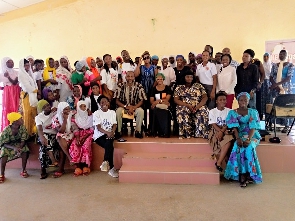She Leads Advocates an organisation in the Upper West Region have identified that skyrocketing prices of sanitary pads has forced many young females in the region to return to indigenous ways of managing menstrual flows.
According to the advocates, the number of girls who were reversing back to high-risk indigenous ways of managing their menstrual periods has increased lately due to the high cost of sanitary pads.
The She Leads Advocates, under the aegis of Community Aid for Rural Development (CARD Ghana), made this known in Wa during a 'Girls Meet Up With Mentors' session held with political leaders over the weekend.
During the Meet Up, the advocates presented fact sheets on situational analysis, potential health risks and psychological effects associated with the sporadically increasing prices of sanitary pads.
"Newer and newer girls are subscribing to the use of rag cloths, tissue and cement papers due to the current outrageous prices of pads in the local market", Alice Sienso read the situational analysis.
She continued, "Sadly, however two of the alternatives above are of great threat to the health growth and development of adolescent girls in the region and for that matter needs to be attended to
"We stand the risk of recording increased reproductive health infections if these adopted indigenous methods particularly are not checked among vulnerable girls in the region".
The Advocates further revealed that a number of girls stayed off school during their menstruation periods due to their inability to appropriately manage the menstrual flows.
"Now, our concern centers around the physical changes that take place in the pad. The red blood we all know during menstruation turns brown and black on the pad when the pad is overused in the day
"Clearly, the physical changes in colour may have some other transitions we cannot possibly see with our eyes. But sometimes, the reactions that further generate rashes around the reproductive organ suggest that there are more likely higher infections than just the physical rashes seen in that situation", she read.
Aabidat Mohammed read portions of the potential health risks and she said:
"Honorable guests, it is not an easy decision to make when you know the blood is about to flow, yet you don't have pad and don't wish to skip school either. In the process of getting a solution to this dilemma, girls fall victims to some of the juicy offers most likely to address the situation. That is how some of
them ended with these complicated social problems like teenage pregnancy".
The She Leads Advocates added that the situation of increasing prices of sanitary goods has led to the exploitation of girls' vulnerability as the young girls are forced to 'pay in body' to males in order to secure at least a pack of sanitary pad.
"We therefore stand in solidarity with the many vulnerable girls and their myriad challenges to call on government to as a matter of urgency evade taxes on sanitary pads so as to mitigate the agony and psychological trauma that comes with the struggle for sanitary pads among vulnerable girls in the country today", they appealed.
The Advocates averred that exemption of taxes on sanitary pad was the only sure way to reducing the ever-increasing frustrations associated with managing menstrual flows among vulnerable girls and young women in Ghana.
Khalida Seidu, the Upper West Regional Deputy Women's Organizer of the National Democratic Congress (NDC), in her address, said the call for tax exemption on sanitary pads was genuine and that the national women's wing of the NDC was already making same demand of the government to remove the taxes on sanitary pads.
Meanwhile, the advocates sent a petition to the Wa Central Member of Parliament, Hassan Rashid Pelpuo, appealing to his office to:
Table concerns of young people, thus the removal of 20% import duty and 15% import VAT on sanitary products, on the floor of parliament for consideration by the house.
Support the She Leads Advocates and Department of Gender –Wa to set up a sanitary Pas Bank for the Wa Methodist School for the Blind to aid girls to have access to sanitary pads during their menstruation.
The petition was received by Issahaku Nuhu Putiaha, a former Municipal Chief Executive of Wa Central, on behalf of the MP.
Regional News of Thursday, 15 June 2023
Source: Sampson Manu
Girls forced to use rags due to skyrocketing prices of sanitary pads
Entertainment
















